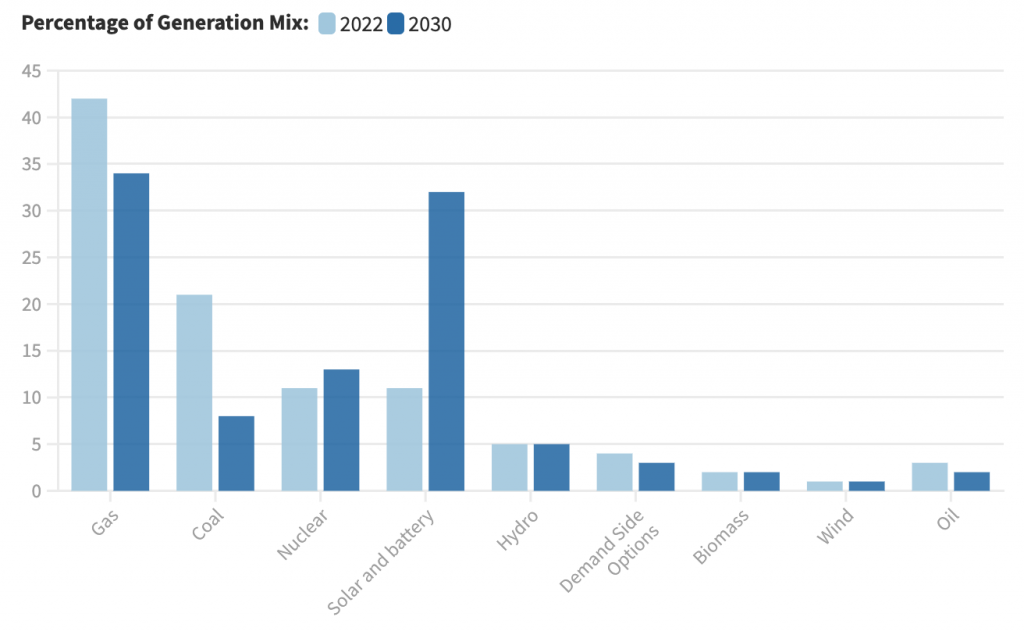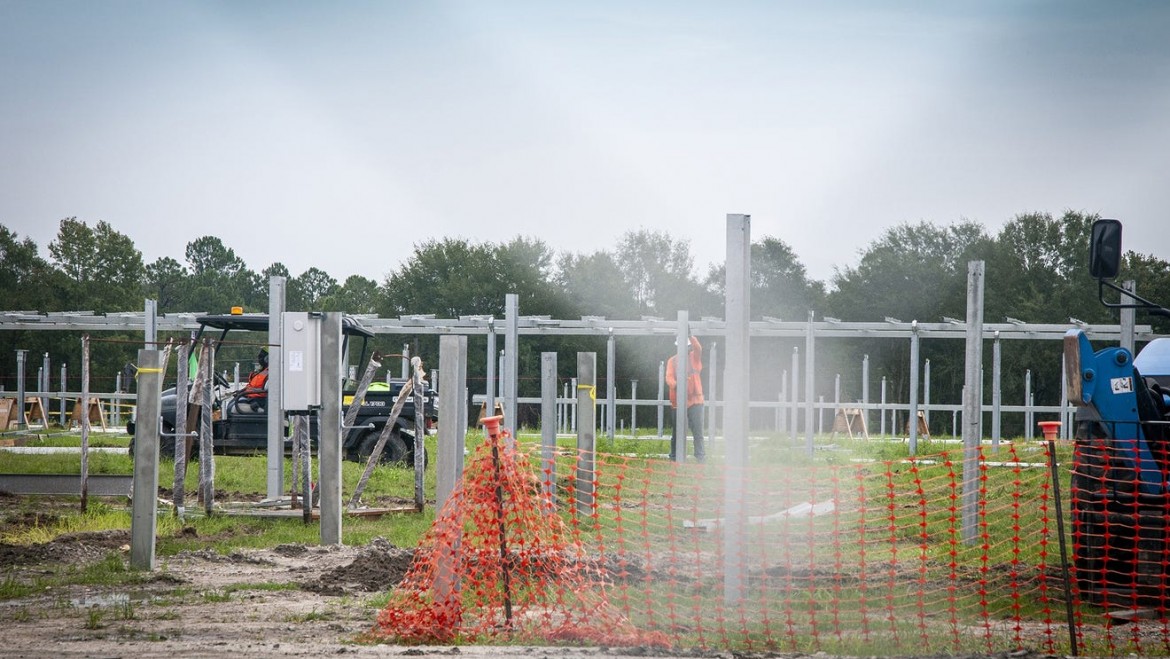By Abraham Kenmore, Augusta Chronicle —
Georgia Power grabbed headlines with its Integrated Resource Plan on Jan. 31. The proposal for how the energy company plans to run for the next three years included shutting down almost all of its coal and oil plants in favor of natural gas and solar.
Filing the plan is just the first step, however. It still has to go before the Georgia Public Service Commission for approval, and consumer and environmental advocates across the state are gearing up to have their say in the process.
Georgia Public Service Vice Chairman Tim Echols had previously given The Chronicle a preview of what he thought the major issues would be regarding power in Georgia this year. With the release of the IRP, he said the commissioners — who have to approve the proposed changes — will look at a number of factors.
“Georgia Power is under some pressure to make fundamental changes in their generation sources — both from customers, environmental organizations and even the Southern Company,” Echols wrote in an email. “I want to make sure that all of these changes are in the best interest of our state, our economic development efforts, and of course our ratepayers.”
Energy efficiency
Georgia Power hasn’t proposed to increase its energy efficiency projects, shutting down two and adding one new one. In the IRP, it argues that low natural gas prices, low increases in demand and the growth of renewable energy has made furthering their efficiency measures less economically viable.
But many advocates would like to see more focus on efficiency.
“The cleanest, cheapest source of energy is that which is not produced,” said Liz Coyle, executive director of the consumer advocacy organization Georgia Watch. “It basically seems the company is keeping things status quo.”
Georgia Power anticipates spike in solar generation
Georgia Power’s estimates of what percentage of their generation mix from various sources shows a jump in solar and a decline in coal over the next eight years.

At least three other advocates The Chronicle spoke to said they hoped Georgia Power would focus more on energy efficiency. Georgia Power says that as generation costs have gone down, however, the cost of implementing efficiency programs weighed against the savings makes them harder to justify.
“These resources are an important part of Georgia Power’s resource mix, and, consistent with prior IRPs, the 2022 IRP offers a robust portfolio of these programs for customers,” Georgia Power spokesperson John Kraft wrote in an email. “In addition to traditional energy efficiency and demand response programs, the company is proposing new, innovative programs that leverage emerging technologies.”
Echols also said he would like the state to do more — although he did not say he wanted it to come from Georgia Power, specifically. Georgia currently ranks 11th in the nation for carbon dioxide emissions, according to the U.S. Energy Information Agency, and its power plants release more than 4% of the nation’s sulfur dioxide emissions.
“I would like to see our state do more in energy efficiency incentives, revised building codes and an MLS Realtor listing system that gives home buyers a better idea of the energy costs of a home being purchased,” said Echols.
John Noel, a former representative in the Georgia House and president of Energy + Environment, which does efficiency retrofits, said that advances in efficiency have kept power demands fairly stable in Georgia even as the economy grows.
“They’re adding expensive capacity, and that’s one of the reasons they can take the coal plants offline, because frankly they don’t have much demand anymore,” Noel said.
Georgia Power estimates that energy sales will grow at about 0.8% a year, which Noel said sounds right.
“If the economy is growing at 5%, 4%, why isn’t electricity consumption growing at, let’s just say half that?” he said. “It’s not, and that’s because of efficiency.”
Meeting climate goals
Environmental advocates have mixed feelings on the proposals of the IRP to shut down coal and replace it with natural gas and renewables, taking over 3,500 megawatts offline by 2028.
“We saw a huge amount of coal retirement proposed, and we’re supportive of that coal coming off,” said Alicia Scott, Just Energy manager at the Partnership for Southern Equity, but she remains skeptical of the pivot to natural gas. “Is bringing more gas into the mix consistent with Southern Company’s commitment to be carbon neutral by 2050?”
Kraft said that Georgia Power’s use of natural gas was important still to cover gaps when resources like solar are not producing.
“As a direct result of working with the Commission through previous IRP cycles, Georgia Power has already made significant, cost-effective and reliable resource planning decisions that have resulted in a mix of lower-carbon energy resources that benefit all customers,” he wrote. “In fact, from its peak in 2007, the company has reduced its carbon emissions by more than 60 percent through 2020.”
Georgia Power plans to bring 2,330 megawatts online by the end of 2024, most of it solar, although they are also exploring some other possibilities such as taller wind turbines. They are looking to bring 2,356 megawatts from natural gas power agreements through 2028.
“I think the PSC should be all over them to get more solar,” said Noel, as well as looking into other renewable resources. “Solar is kind of old hat … but we should be building offshore wind.”
Echols said he thinks Georgia Power probably knows its own generating system, although he said there is still a debate about whether it can maintain reliability while closing the coal and oil plants on the timeline laid out.
“The Southern Company knows their grid, their plants and customer usage – so I would tend to believe their assessments,” said Echols. “Everyone needs to remember, though, that the utility commissioners in each Southern Company state have the final say on whether the utility’s grid plans are actually the best way forward for each respective state.”
Major changes
Georgia Power currently generates about 14,413 megawatts of power annually, but one of the most significant proposed changes may not be how the power is generated, but how it is stored.
Part of the proposal is a dramatic increase to add 1,000 megawatts of Energy Storage Systems such as industrial batteries by 2030.
“You can see solar plus storage as competitive with natural gas,” said Jill Kysor, senior attorney at the Southern Environmental Law Center.
Echols previously told The Augusta Chronicle he was anticipating a large ask for batteries. He said the IRP laid out a reasonable path forward.
“I agree with easing into the world of battery storage, and Georgia Power’s plan triples what we have now, and gradually grows from there to a gigawatt,” Echols wrote. “My concern right now with batteries is making sure they perform as promised so our ratepayers get value.”
Beyond the cutting edge expansion, there are also a couple of ongoing issues that Georgia Power is still working on.
It owns a large portion of the Plant Vogtle Unit 3 and 4 expansion, which is both late and over budget. Once the plants come online, the PSC will determine how much of the costs can be recouped from rate payers — but it will increase costs by up to 10%.
“The future for rates ain’t good,” said Noel. “This is going to bite us all.”
Georgia Power will also have expenses associated with shuttering the coal plants and cleaning up coal ash in ponds.
“One of our points of contention has been who’s going to pay for fixing all the coal ash ponds that need new liners,” said Scott. “I would like to see a lot more resources put behind the environmental justice, coal ash pond mitigation, the extractive — the extractive energy generation places that tend to harm historically marginalized communities, low wealth communities, Black and brown communities.”
Georgia Watch’s Coyle says she hopes the state legislature will pass a proposal introduced in the Georgia State Senate this week, SB 421, that would allow the Public Service Commission to authorize major projects to be funded through utility securitization bonds. Aimed at the Vogtle expansion, shuttering of coal plants and coal ash clean up, Coyle said the bipartisan bill would allow the funding to come from low interest bonds, rather than more expensive traditional financial routes.
“That’s a definite way the company can have downward pressure on rates,” said Coyle. “By using securitized bonds to finance certain things that are in the IRP, that would be financed at a much lower cost than … their traditional financing mechanism.”
Kraft, the Georgia Power spokesperson, said the company is still evaluating the legislation.
Beyond the rates Georgians pay for their energy, though, some advocates want more opportunities for all Georgians to lower their energy consumption and generate power closer to home.
“What we’re looking for are opportunities for everyday Georgians to have access to energy efficiency savings programs that can help them lower their monthly bills, in addition to cleaning up the energy mix and access to either rooftop solar or community solar, again giving folks access to clean, affordable energy,” said Kysor.
Copyright © 2022 Energywire

